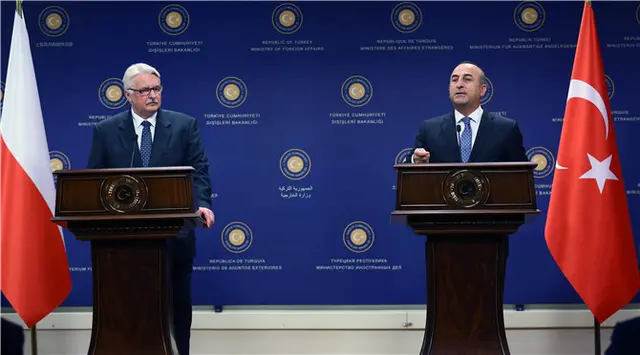Concerns over the implementation of a recent deal between Turkey and the European Union (EU) to cut back on irregular migration have not completely dissipated.
"The European Union is still taking it slow in providing three billion euros that will go to Syrians in Turkey," Turkish Foreign Minister Mevlut Cavusoglu said in an interview with a Turkish TV on Thursday night.
The Turkish foreign minister acknowledged there were problems in carrying out the deal which he said fuels pessimism among Turks and Syrians.
Cavusoglu repeated his earlier threat of suspending the readmission and other deals Turkey have inked with the EU to prevent irregular migration.
The readmission is part of a deal that was agreed on March 18 by the EU and Turkey to regulate migration and refugee flows.
According to the deal, for every migrant Turkey receives, the EU promised to repatriate one to its member states although the cap was set at 72,000.
The European Commission said 325 irregular migrants had been sent back to Turkey while 103 Syrian refugees have been repatriated in EU member states.
Brussels also pledged to provide six billion euros until 2018 to help ease burden Turkey shoulders for hosting three million refugees as well as granting visa-free travel to Europe for Turkish citizens as of June.
On Wednesday, the Parliamentary Assembly of the Council of Europe (PACE), 47-member regional organization in which Turkey is a full member, issued a critical review of the EU-Turkey migrant deal, saying the agreement "raises several serious human rights issues."
Turkish Prime Minister Ahmet Davutoglu tried to allay concerns in his address to the PACE on Tuesday, telling European lawmakers that irregular migration is a common challenge for all.
He said that the Turkish government managed to decrease the number of irregular migrants crossing the Aegean between Turkey and Greece to 60 a week from 6,800 a day on average.
"However, it is obvious that Turkey's efforts alone will not suffice," Davutoglu warned.
Speaking at the border province Gaziantep in the southeast of Turkey, Deputy Prime Minister Yalcin Akdogan, who is in charge of refugee and migrant matters in the government, lamented that Turkey was left alone in dealing with refugees.
Stressing that Turkey has spent some 10 billion U.S. dollars for refugees so far, Akdogan said the funds came from outside was amounted to only 462 million U.S. dollars so far.
Turkey opposition critical of government
The Turkish opposition has been critical of the government on the implementation of the migrant deal, saying that the country has turned into a big refugee camp.
Zeynel Emre, a lawmaker from the main opposition Republican Peoples' Party (CHP), said Turkey has already reached to its limit by accepting millions of refugees.
He warned that the number would likely increase as a result of the migrant deal with the EU.
Namik Havutca, a lawmaker from northwestern province Balikesir, said in the parliament that his constituency does not want migrant camps in their own districts.
He underlined that both Balikesir and neighboring provinces, located along the shorelines of the Aegean Sea where migrants cross to Greece, demand the camps to be relocated in other places for fear of hurting tourism and other economic sectors in the western region.
On Wednesday, the opposition Nationalist Movement Party (MHP) submitted a motion to the parliament asking to establish an Investigation Commission to look into a host of challenges refugees have created for Turkey.
Tuba Demirci, an academic working on refugee issues at Istanbul Kemerburgaz University, said Turkey should brace itself with a host of problems with the return of migrants from Europe.
She raised the risk of a backlash from local resident to migrants returned from Greece, saying that more awareness among locals is needed.
Racing against time to fulfill criteria
As part of the deal, Turkey has been rushing to satisfy all the 72 criteria set by the EU to grant visa-free travel to Turkish citizens by June.
Serkan Demirtas, a Turkish analyst, said Ankara has already fulfilled 61 of the 72 criteria required for its citizens to travel to EU member states that implement common visa policy.
"With the successful implementation of the migrant deal, which has significantly reduced the number of irregular migrants seeking refuge on Greece's islands, Turkey's expectation for visa liberalization now sit at the core of intense talks between Ankara and Brussels," he explained.
However, the EU did not reveal how many benchmarks Turkey has completed so far.
On Wednesday, the EU instead announced that if Turkey fulfilled all the necessary measures in the next two weeks, the European Commission would start procedures on May 4 to put Turkey on the EU' s visa-free travel list.
Turkey hopes to satisfy the remaining benchmarks before May 4.
"I am pleased to say that progress has been made," EU Migration Commissioner Dimitris Avramopoulos said.
According to analyst Murat Yetkin, Ankara's explicit threat of suspending the migration deal forced the EU to look favorably for the visa deal.
"Turkey is making it crystal clear that if Brussels fails to keep its promises, Ankara would tear up the [migrant] deal," he noted.
German Chancellor Angela Merkel and European Council President Donald Tusk are scheduled to arrive Turkey on Saturday to pay a visit to refugee camps in Turkey's border province of Gaziantep.
Their visits come on the heels of NATO Secretary-General Jens Stoltenberg's two-day visit to Turkey this week during which he elaborated on NATO's help in cracking down on human traffickers.
"Figures from different international organizations confirm that the numbers of migrants and refugees crossing the Aegean Sea are now going significantly down," Stoltenberg told reporters.
The refugee and migrant issues are expected to be dealt with during the World Humanitarian summit that will be hosted by Turkey in Istanbul on May 23-24.
 简体中文
简体中文

